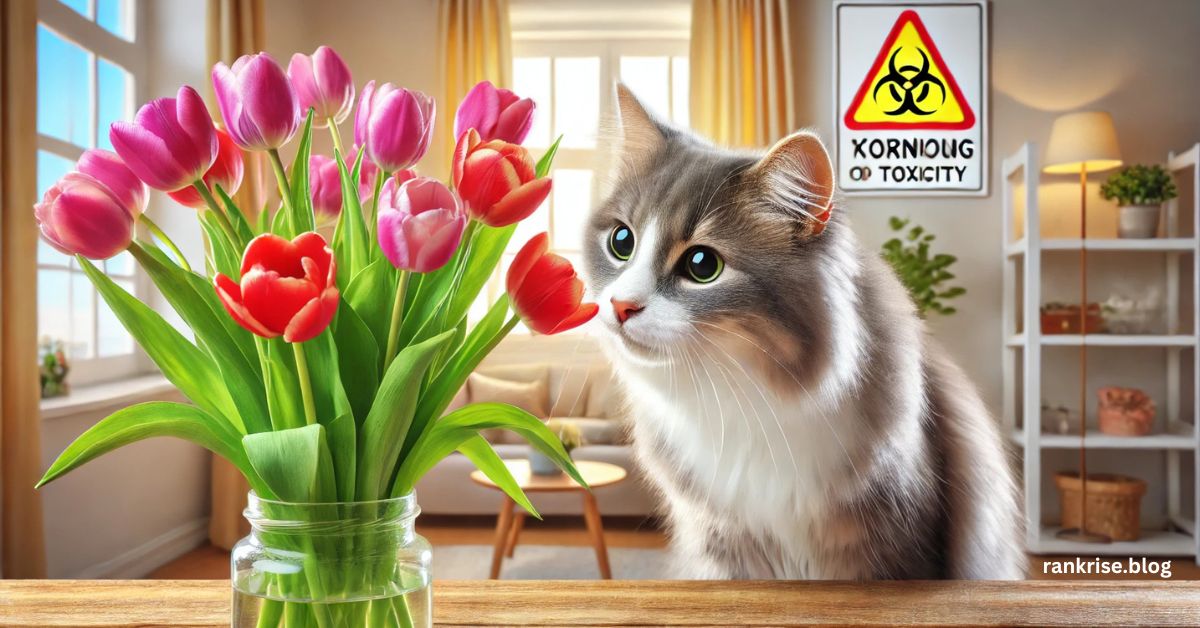Tulips are among the most popular flowers, admired for their bright colors and elegant appearance. Many pet owners enjoy having tulips in their homes or gardens without realizing that these beautiful flowers can pose a serious risk to their feline companions. Are tulips toxic to cats? Yes, they contain harmful compounds that can cause poisoning if ingested. If you’re a cat owner, it’s important to understand how tulips can affect your pet and what to do if your cat comes into contact with them. In this article, we’ll explore whether are tulips toxic to cats, the symptoms of tulip poisoning, treatment options, and how to prevent accidental ingestion.
Understanding Tulip Toxicity in Cats
Yes, are tulips toxic to cats. They contain harmful compounds called tulipalin A and B, which are found in all parts of the plant, with the highest concentration in the bulb. If a cat chews on or ingests tulips, it can experience mild to severe health issues.
Cats are naturally curious creatures, and they often explore their surroundings by nibbling on plants. Because of this, tulips can pose a significant threat if they are accessible to your pet. Even small amounts can cause distressing symptoms, making it essential to keep these flowers out of reach.
Symptoms of Tulip Poisoning in Cats
If your cat has ingested any part of a tulip, you may notice one or more of the following symptoms:
- Excessive drooling
- Vomiting
- Diarrhea
- Lethargy or depression
- Loss of appetite
- Increased heart rate
- Difficulty breathing
- Tremors or convulsions (in severe cases)
Symptoms may appear within a few hours of ingestion and can vary depending on how much of the plant your cat consumed. Mild cases may only involve gastrointestinal discomfort, while severe poisoning can lead to more serious complications that require urgent medical care.
What to Do If Your Cat Eats a Tulip
If you suspect that your cat has ingested any part of a tulip, take immediate action:
- Remove any remaining plant material from your cat’s mouth to prevent further ingestion.
- Observe your cat for symptoms of poisoning, such as vomiting or lethargy.
- Call your veterinarian or a pet poison control center for guidance. If symptoms are severe, take your cat to the vet immediately.
- Do not attempt home remedies or induce vomiting unless instructed by a professional.
- Provide your vet with information about how much of the plant your cat may have eaten and any symptoms observed.
Early intervention is crucial to ensure your cat’s safety and prevent more serious health issues.
How Veterinarians Treat Tulip Poisoning in Cats
If your cat has ingested tulips and is showing signs of poisoning, a veterinarian may use several treatment methods:
- Inducing vomiting or administering activated charcoal to prevent further toxin absorption.
- Providing IV fluids to help flush toxins from the body and prevent dehydration.
- Prescribing medications to manage symptoms like nausea, pain, or irregular heart rate.
- Monitoring your cat’s condition to ensure there are no lasting effects from the poisoning.
The prognosis for tulip poisoning is generally good if treatment is received promptly. Most cats recover fully within a few days with proper care.
How to Prevent Tulip Poisoning in Cats
To keep your feline friend safe, follow these preventive measures:
- Keep tulips out of reach. Avoid placing tulip bouquets in areas where your cat can access them, such as countertops or low tables.
- Avoid planting tulips in your garden. If you have an outdoor cat, consider choosing non-toxic flowers instead.
- Use cat-friendly plants. Opt for cat-safe alternatives such as spider plants, Boston ferns, or cat grass.
- Educate family members. Make sure everyone in your household understands the dangers of tulips to prevent accidental exposure.
Cat-Friendly Flower Alternatives
If you love having flowers in your home but want to ensure your cat’s safety, consider these pet-friendly options:
- Roses
- Orchids
- Sunflowers
- Marigolds
- African violets
- Snapdragons
- Petunias
These flowers provide a beautiful and safe environment for both you and your feline companion.
Conclusion
Are tulips toxic to cats? Yes, tulips are beautiful but pose a serious threat to cats due to their toxic compounds, making them a hidden danger for pet owners. The toxic compounds in tulips can cause a range of health issues, from mild stomach upset to serious poisoning. If you have a cat, it’s best to avoid having tulips in your home or garden to prevent accidental ingestion. By being aware of the risks and taking proactive measures, you can ensure your feline friend stays safe and healthy.
If you suspect tulip poisoning in your cat, contact your veterinarian immediately. With prompt treatment, most cats recover without long-term effects. Remember, prevention is key—choose pet-friendly plants to create a safe environment for your beloved pet!
Frequently Asked Questions (FAQs)
Are all tulip varieties toxic to cats?
Yes, all tulip varieties contain tulipalin A and B, making them toxic to cats. If you are wondering, “are tulips toxic to cats?” the answer is always yes, regardless of the type of tulip.
Can tulips cause long-term damage to my cat?
In most cases, if treated promptly, tulip poisoning does not cause long-term damage. However, severe poisoning can lead to complications if not addressed quickly. Always ask yourself, “are tulips toxic to cats?” before bringing them into your home.
What other plants are toxic to cats?
Other common toxic plants for cats include lilies, daffodils, azaleas, and oleander. Always research plant safety before bringing new greenery into your home. The question, “are tulips toxic to cats?” is frequently searched because tulips are among the more common toxic plants.
What should I do if my cat brushes against a tulip but doesn’t eat it?
If your cat simply comes into contact with a tulip but does not ingest it, there is little risk. However, wash off any pollen or plant residue from their fur to prevent accidental ingestion during grooming. Remember, the concern “are tulips toxic to cats?” applies mainly to ingestion.
How much tulip does a cat need to eat to get sick?
Even a small amount of tulip plant material can cause symptoms. The bulbs contain the highest concentration of toxins and pose the greatest risk. If you’re ever uncertain, ask yourself again: “are tulips toxic to cats?” and take precautions
Keep Your Cat Safe – Choose Non-Toxic Plants!
Your cat’s health is a top priority. Make informed choices when it comes to houseplants and flowers to create a safe and happy home for your furry friend.



